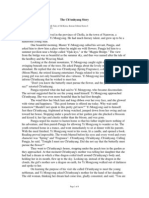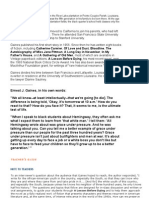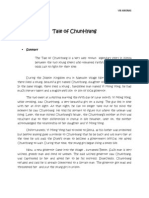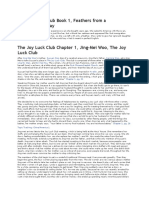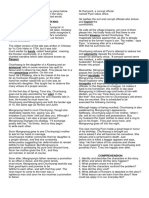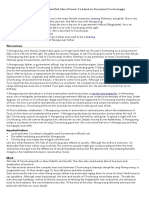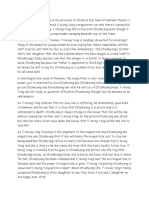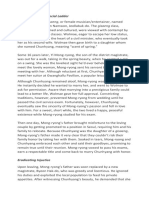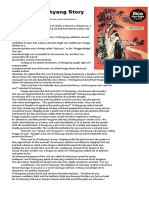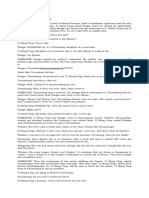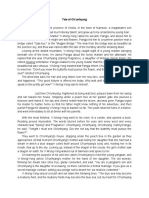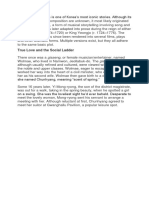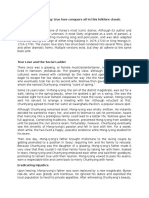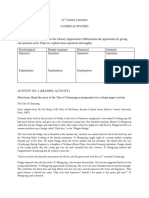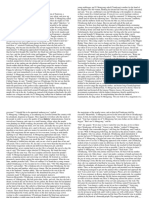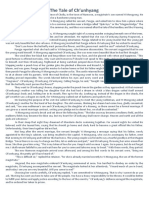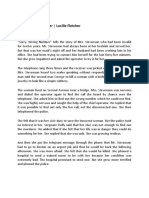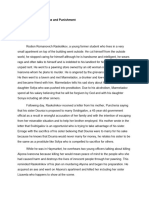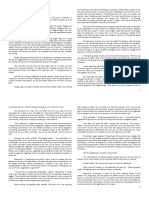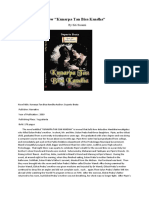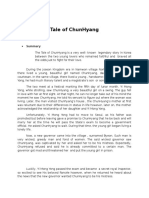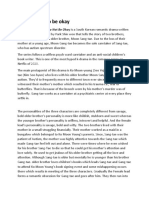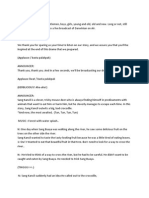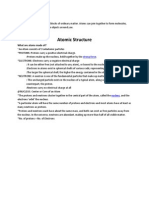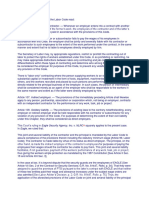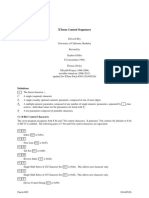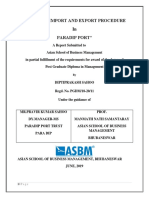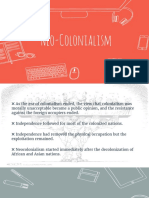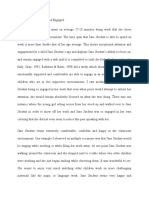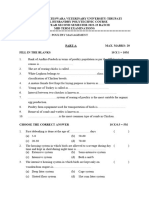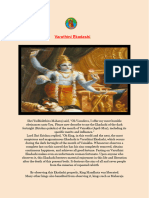The Tale of Chunhyang
The Tale of Chunhyang
Uploaded by
fghvfhfCopyright:
Available Formats
The Tale of Chunhyang
The Tale of Chunhyang
Uploaded by
fghvfhfOriginal Description:
Copyright
Available Formats
Share this document
Did you find this document useful?
Is this content inappropriate?
Copyright:
Available Formats
The Tale of Chunhyang
The Tale of Chunhyang
Uploaded by
fghvfhfCopyright:
Available Formats
Chunhyang is the daughter of a Kisaeng and an aristocrat (who
in some versions has split for Seoul and in others he has died).
This places her in a very precarious position. On the one hand,
as a Kisaeng, she is the lowest of the low as far as Confucian
thought goes, on the other hand her mother raised her as if she
was an aristocrat's daughter. She taught her to observe the
many virtues of a proper woman.
On the first day of Spring, Tano day, Chunhyang goes out to
play escorted by her valet. In the distance, Mongnyong sees
her and instantly falls in love. He knows he must have her.
Chunhyang and Mongnyong are both the tender age of 15, the
same age as Romeo and Juliet.
Mongnyong tried to court Chunhyang, though she obstinately
rejects him, saying 'you are mistaken if you think I will just obey
you. Although I am a kisaeng, I am also a proper woman!'
Mongnyong changes his strategy. "I'll exchange poetry with
her," he thinks. And so they begin to write each other.
Soon Mongnyong goes to see Chunhyang's mother to ask for
her hand in marriage. Chunhyang's mother comments that her
daughter is a proper woman, and that she constantly
writes poetry suggesting her determination to remain faithful
to her husband. But Mongnyong is persistent in professing his
pure and innocent love. Soon her mother gives the O.K., and
they are married, in secret of course.
Soon after, Mongnyong's father receives a promotion to an
office in Seoul, and the entire family must move. Mongnyong
and Chunhyang tearfully say their good-bye's and promise to
be faithful to each other, and with that they part. The next
mayor to come to the town was a righteous man and soon he
too receives a promotion to Seoul. At that point, a corrupt
official named Pyon takes office. He typifies the evil and
corrupt officials who torture and exploit the
commoners.
The Tale of
Chunhyang
He calls all the village kisaeng, yet none of them please him. He
finally finds out that there is one beautiful kisaeng named
Chunhyang. The magistrate advises against that, as she is
already married to the former mayor's son. "No matter," says
Pyon, "a kisaeng after all is a kisaeng!" With that he summons
her.
Chunhyang refuses all Pyon's attempt to seduce her and
adamantly repeats the Confucian maxim for womanly virtue, "A
servant cannot serve two masters, a wife cannot serve two
husbands!" Enraged, Pyon has her beaten and thrown into
prison.
Meanwhile, Mongnyong has finished his studies and passes the
Confucian Examination with the highest accolade. He is given
his choice of any job. Mongnyong chooses to become the
Secret Royal Inspector who must travel the countryside
incognito and expose corrupt governors and officials. In the
disguise of a beggar, he makes it back to his hometown. His
mother in law sees Mongnyong in tattered rags and looks at
him with disdain, as if to say "How dare you show up like that!"
She escorts him to Chunhyang's cell where they are reunited.
She is scheduled to be executed the following morning.
Although happy at being reunited, Chunhyang is also saddened
by Mongnyong's appearance. Selflessly, Chunhyang says to her
mother, 'when I die, sell all my clothes and possessions. Buy my
husband the finest clothes to wear and a ring to put on his
finger.' They part once more, and Mongnyong goes off into the
night.
The next morning Pyon holds a great feast in honor of his
birthday. Chunhyang is brought out and is asked if she will
become his concubine. She refuses and is sentenced to death.
Just before she is killed a beggar appears and says, 'stop.' He
then takes off his costume and shows his royal inspector's seal.
He saves Chunhyang and punishes Pyon. They live happily ever
after.
You might also like
- Tale of Ch'unhyangDocument6 pagesTale of Ch'unhyangMelanio80% (264)
- Read Trial Marriage Husband - Need To Work Hard - Chapter 1 - The Flash Marriage Wife Online Free - NovelFullDocument4 pagesRead Trial Marriage Husband - Need To Work Hard - Chapter 1 - The Flash Marriage Wife Online Free - NovelFullMitchelGramaticaNo ratings yet
- A Lesson Before DyingDocument8 pagesA Lesson Before Dyingsldp27100% (2)
- The Tale of ChunhyangDocument2 pagesThe Tale of Chunhyangbaymax69% (13)
- The Tale of ChunhyangDocument1 pageThe Tale of ChunhyangMar SebastianNo ratings yet
- Tale of ChunHyang - DbvvbocxDocument2 pagesTale of ChunHyang - DbvvbocxEks Wai74% (65)
- The Joy Luck Club Book 1Document12 pagesThe Joy Luck Club Book 1loronalicelNo ratings yet
- Integrated Pest Management: Current Concepts and Ecological PerspectiveDocument2 pagesIntegrated Pest Management: Current Concepts and Ecological PerspectiveAtha FrrNo ratings yet
- The Tale of ChunhyangDocument2 pagesThe Tale of Chunhyangrhedz1850% (2)
- The Tale of ChunhyangDocument1 pageThe Tale of ChunhyangAbsquatulateNo ratings yet
- The Tale of ChunhyangDocument1 pageThe Tale of ChunhyangNiña Anne DelaCruz RamosNo ratings yet
- The Tale of ChunhyangDocument4 pagesThe Tale of Chunhyangmonalisa integroNo ratings yet
- The Tale of ChunhyangDocument2 pagesThe Tale of ChunhyangNiña Anne DelaCruz Ramos100% (1)
- Summary of Tale of ChunhyangDocument1 pageSummary of Tale of ChunhyangAndrea Leziel PajarilloNo ratings yet
- Main CharactersDocument2 pagesMain CharactersBotzBotzBotzNo ratings yet
- True Love and The Social LadderDocument2 pagesTrue Love and The Social LadderHirito KirisagiNo ratings yet
- The Tale of Chunhyang STORYDocument3 pagesThe Tale of Chunhyang STORYJessie Roldan VillanuevaNo ratings yet
- The ChunyangDocument4 pagesThe ChunyangEusebio CadagNo ratings yet
- The Chunhyang StoryDocument3 pagesThe Chunhyang StorymartgetaliaNo ratings yet
- Bda 3 The Tale of ChunhyangDocument1 pageBda 3 The Tale of ChunhyangWesley BrixNo ratings yet
- Assignment Lesson Plan 2019Document2 pagesAssignment Lesson Plan 2019Karen Joy JajallaNo ratings yet
- The CHDocument4 pagesThe CHRigorMortizNo ratings yet
- Tale of ChunhyangDocument5 pagesTale of ChunhyangEdmon FabregasNo ratings yet
- The Girl From YunnanDocument11 pagesThe Girl From Yunnanfalconking88No ratings yet
- Legend of Ch'UnhyangDocument3 pagesLegend of Ch'Unhyangleomille2No ratings yet
- Kisaeng: Tale of Ch'unhyangDocument5 pagesKisaeng: Tale of Ch'unhyangJesse RnyNo ratings yet
- The Chunhyangjeon Is One of KoreaDocument3 pagesThe Chunhyangjeon Is One of Koreachumary kc olitaNo ratings yet
- Helllooooooowww: The Ch'unhyang StoryDocument6 pagesHelllooooooowww: The Ch'unhyang StoryJared Floyd LorezoNo ratings yet
- The Tale of Chunhyang: True Love Conquers All in This Folklore ClassicDocument3 pagesThe Tale of Chunhyang: True Love Conquers All in This Folklore Classicsquidblitz100% (1)
- 21st-Century-Literature-GUIDED-ACTDocument5 pages21st-Century-Literature-GUIDED-ACTjdc43965No ratings yet
- The Chungyang StoryDocument4 pagesThe Chungyang StorySharon BakerNo ratings yet
- Tale of ChungyangDocument3 pagesTale of ChungyangGem Aquino-AlferosNo ratings yet
- The Tale of ChunhyangDocument3 pagesThe Tale of ChunhyangIrene Pablico-IgnaNo ratings yet
- Short DramasDocument4 pagesShort DramasAsim BistaNo ratings yet
- Document 2 8Document5 pagesDocument 2 8elijahmagtajasNo ratings yet
- Tale of ChunhyangDocument33 pagesTale of ChunhyangGlaiza Carla Festin Fano0% (1)
- Book Review - Crime and PunishmentDocument8 pagesBook Review - Crime and Punishmentjoeydc009No ratings yet
- Tale of ChunhyangDocument4 pagesTale of ChunhyangRhea Joy MonteNo ratings yet
- Book Report On Train To PakistanDocument24 pagesBook Report On Train To PakistanNamrata VohraNo ratings yet
- StoryDocument8 pagesStoryusama akbarNo ratings yet
- NarrativeDocument5 pagesNarrativeNovia Analyes PratiwiNo ratings yet
- Love You To DeathDocument9 pagesLove You To DeathVivien DNo ratings yet
- Review NovelDocument3 pagesReview NovelMas Narto ChanelNo ratings yet
- Chunyang StoryDocument2 pagesChunyang StoryAimee Hernandez100% (1)
- Indlovukazi uLiyana.pdfDocument115 pagesIndlovukazi uLiyana.pdfsinakhomthembu96No ratings yet
- The Tale of Genji Plot Summary, Ch. 1 - 12Document4 pagesThe Tale of Genji Plot Summary, Ch. 1 - 12Susan Rowe80% (5)
- Crime and Punishment: St. PetersburgDocument1 pageCrime and Punishment: St. PetersburgLal SajjadNo ratings yet
- The Bear - For MergeDocument2 pagesThe Bear - For MergeMaster DewNo ratings yet
- Enigmatic BondDocument3 pagesEnigmatic BondamakaanaguNo ratings yet
- PrajDocument2 pagesPrajAakansha G ShresthaNo ratings yet
- NovelsDocument3 pagesNovelsitzgaya0% (6)
- I Just Called To Say I Love YouDocument52 pagesI Just Called To Say I Love YouBee ParkNo ratings yet
- Within the Law: Chelle Cordero's Cousins SuspensesFrom EverandWithin the Law: Chelle Cordero's Cousins SuspensesRating: 5 out of 5 stars5/5 (3)
- Crime and Punishment by Fyodor Dostoyevsky (Book Analysis): Detailed Summary, Analysis and Reading GuideFrom EverandCrime and Punishment by Fyodor Dostoyevsky (Book Analysis): Detailed Summary, Analysis and Reading GuideRating: 5 out of 5 stars5/5 (1)
- Outwitting A CrocodileDocument3 pagesOutwitting A CrocodilefghvfhfNo ratings yet
- Atomic Structure: AtomsDocument1 pageAtomic Structure: AtomsfghvfhfNo ratings yet
- Mitosis and MeiosisDocument3 pagesMitosis and Meiosisfghvfhf50% (2)
- Math 005 Hw2 (Prelim)Document2 pagesMath 005 Hw2 (Prelim)fghvfhfNo ratings yet
- Printer Projector Speaker CPU Ram Mouse CD Pendrive: MotherboardDocument1 pagePrinter Projector Speaker CPU Ram Mouse CD Pendrive: MotherboardfghvfhfNo ratings yet
- Building Social Harmony Through The Royal Institution in MalaysiaDocument2 pagesBuilding Social Harmony Through The Royal Institution in MalaysiaMOIIRA MALLANI A/P SANTHANAM MoeNo ratings yet
- The Military Papers, 1940-48, of Field-Marshal Sir Claude Auchinleck A Calendar and Index (Bulletin of The John Rylands University Library of Manchester)Document250 pagesThe Military Papers, 1940-48, of Field-Marshal Sir Claude Auchinleck A Calendar and Index (Bulletin of The John Rylands University Library of Manchester)xib4esalesNo ratings yet
- Chapter 11-Rizal in Hongkong and Macau, 1888Document3 pagesChapter 11-Rizal in Hongkong and Macau, 1888sam peligro100% (6)
- Tata Capital Financial Services LTD TCFPL0631000011147040 Fort Mumbai Rahul Vishwanath Mayee 42Document6 pagesTata Capital Financial Services LTD TCFPL0631000011147040 Fort Mumbai Rahul Vishwanath Mayee 42Rahul MayeeNo ratings yet
- Articles 106 Labor CodeDocument3 pagesArticles 106 Labor CodeEgo sum pulcher100% (1)
- Final Coaching-Plumbing CodeDocument13 pagesFinal Coaching-Plumbing Coderyancsalcedo061586No ratings yet
- Codeseller InstallationDocument10 pagesCodeseller InstallationamitkrayNo ratings yet
- The Devil in The DetailsDocument7 pagesThe Devil in The DetailsMartinez DorothyNo ratings yet
- Harga Satuan Material Update: TAHUN 2015: Pt. Mitrabangun AdigrahaDocument41 pagesHarga Satuan Material Update: TAHUN 2015: Pt. Mitrabangun AdigrahaafifNo ratings yet
- Motion To Delcare Default + Notice of HearingDocument4 pagesMotion To Delcare Default + Notice of HearingjrlockejohnNo ratings yet
- Sushruta: Rhinoplasty in 600 B.C.Document4 pagesSushruta: Rhinoplasty in 600 B.C.sahurediffNo ratings yet
- XTerm Control SequencesDocument34 pagesXTerm Control SequencesAetfNo ratings yet
- Fleumer vs. HixDocument1 pageFleumer vs. HixEarl LarroderNo ratings yet
- Konventa e HagesDocument6 pagesKonventa e HagesAnonymous jsofnRLNo ratings yet
- Aspen Tech EngDocument27 pagesAspen Tech EngrakeshlondonNo ratings yet
- Ds GV HD de Tai NCKH Dot 1 NH 2023 2024 0210202345347CHDocument8 pagesDs GV HD de Tai NCKH Dot 1 NH 2023 2024 0210202345347CHPhan Huy BaoNo ratings yet
- Marketing Studies: By: Clarissa T. Payawal Bsentrep. 2-BDocument34 pagesMarketing Studies: By: Clarissa T. Payawal Bsentrep. 2-BNilda Dato AsminNo ratings yet
- KẾT QUẢ SASMO 2024Document4 pagesKẾT QUẢ SASMO 2024danglinh08051989No ratings yet
- Lecture ChessDocument25 pagesLecture Chesses rodulfaNo ratings yet
- Import and Export DataDocument46 pagesImport and Export Datakulamani sahooNo ratings yet
- Emerging Trends in ERP TechnologyDocument7 pagesEmerging Trends in ERP TechnologyAbhishikt Mrinal GreenwoldNo ratings yet
- Neocolonialism FinalDocument23 pagesNeocolonialism FinalGabrielle CatalanNo ratings yet
- Demons of Change - GM BinderDocument10 pagesDemons of Change - GM BinderSaad aldosryNo ratings yet
- Temperament ReportDocument8 pagesTemperament ReportNaomi AkuokoNo ratings yet
- Plano Electrico 834 BTX PDFDocument19 pagesPlano Electrico 834 BTX PDFtommy lanyonNo ratings yet
- DAH 122 PART A Question PaperDocument3 pagesDAH 122 PART A Question PaperBashyam Nageswara ReddyNo ratings yet
- Office AssignmentDocument1 pageOffice AssignmentlintangNo ratings yet
- EkadasiDocument3 pagesEkadasiPrasann KatiyarNo ratings yet
